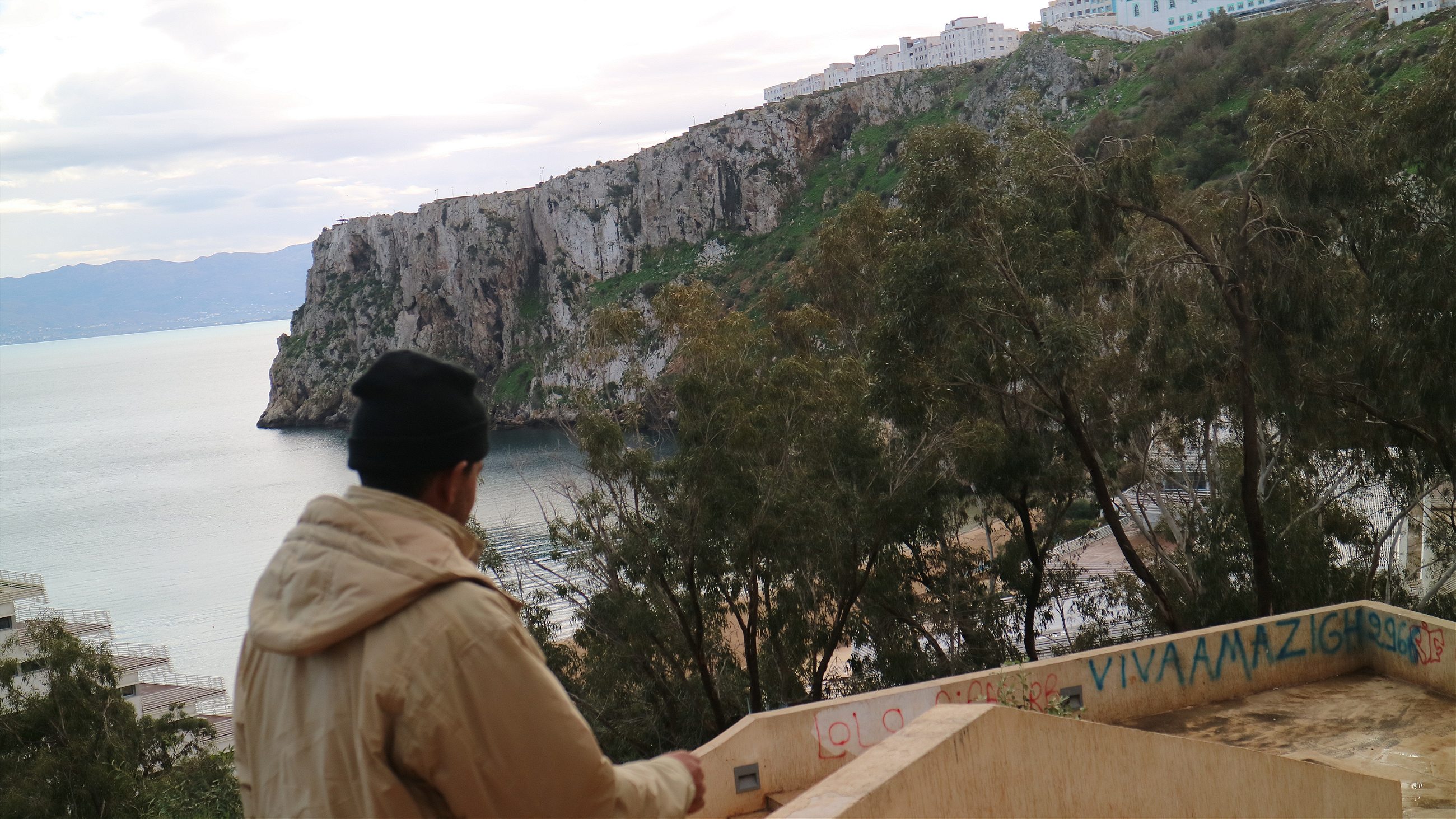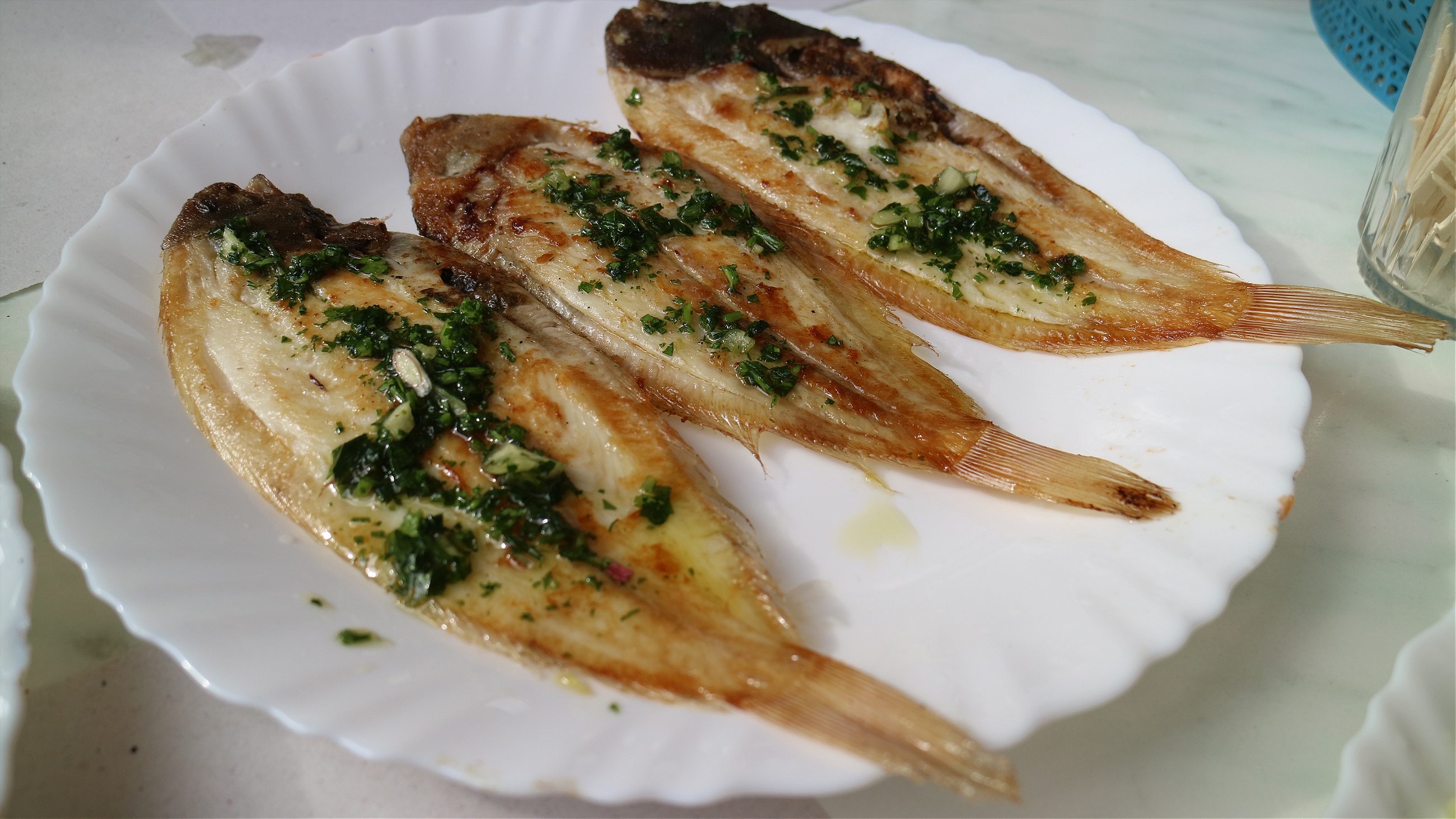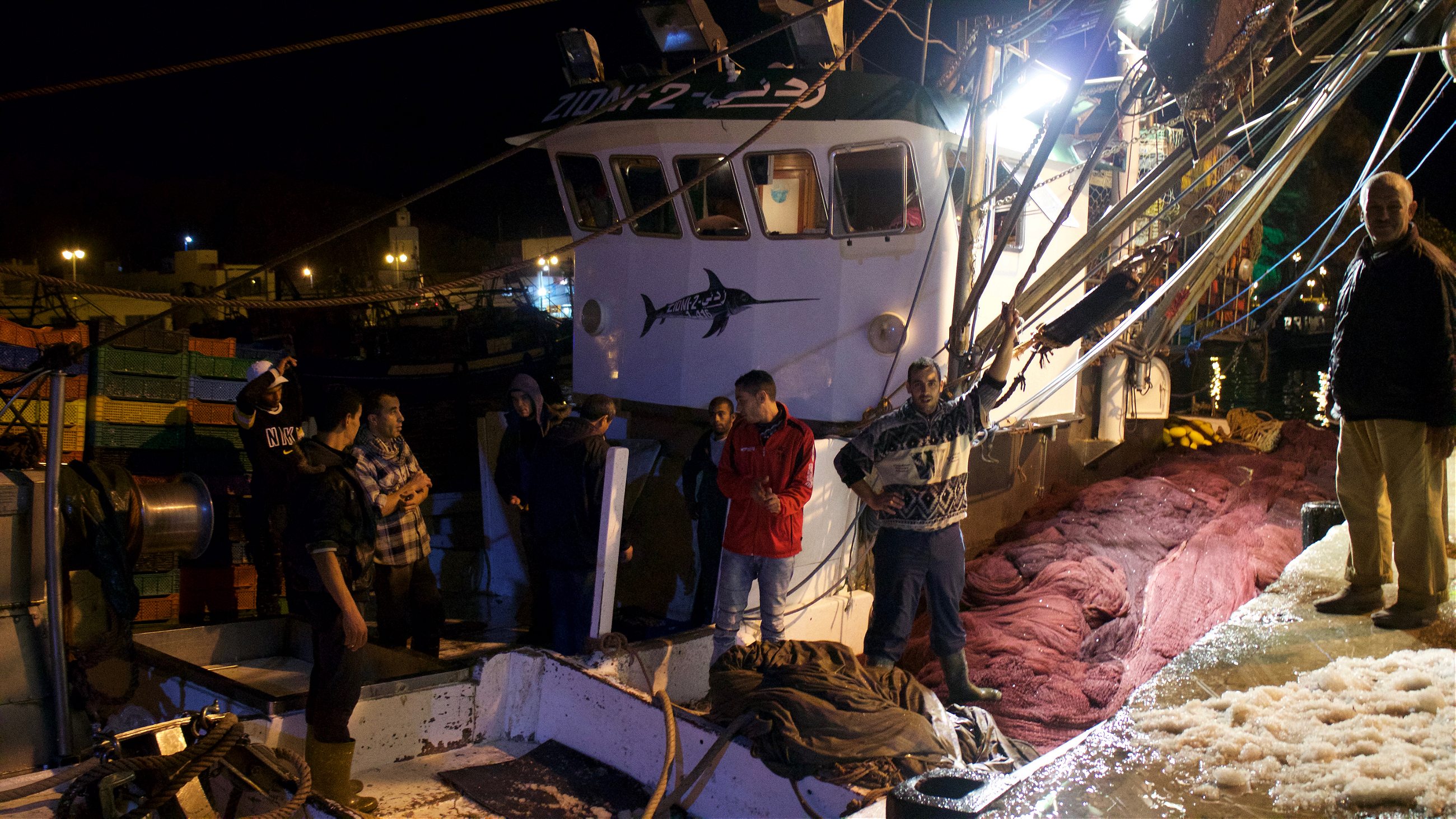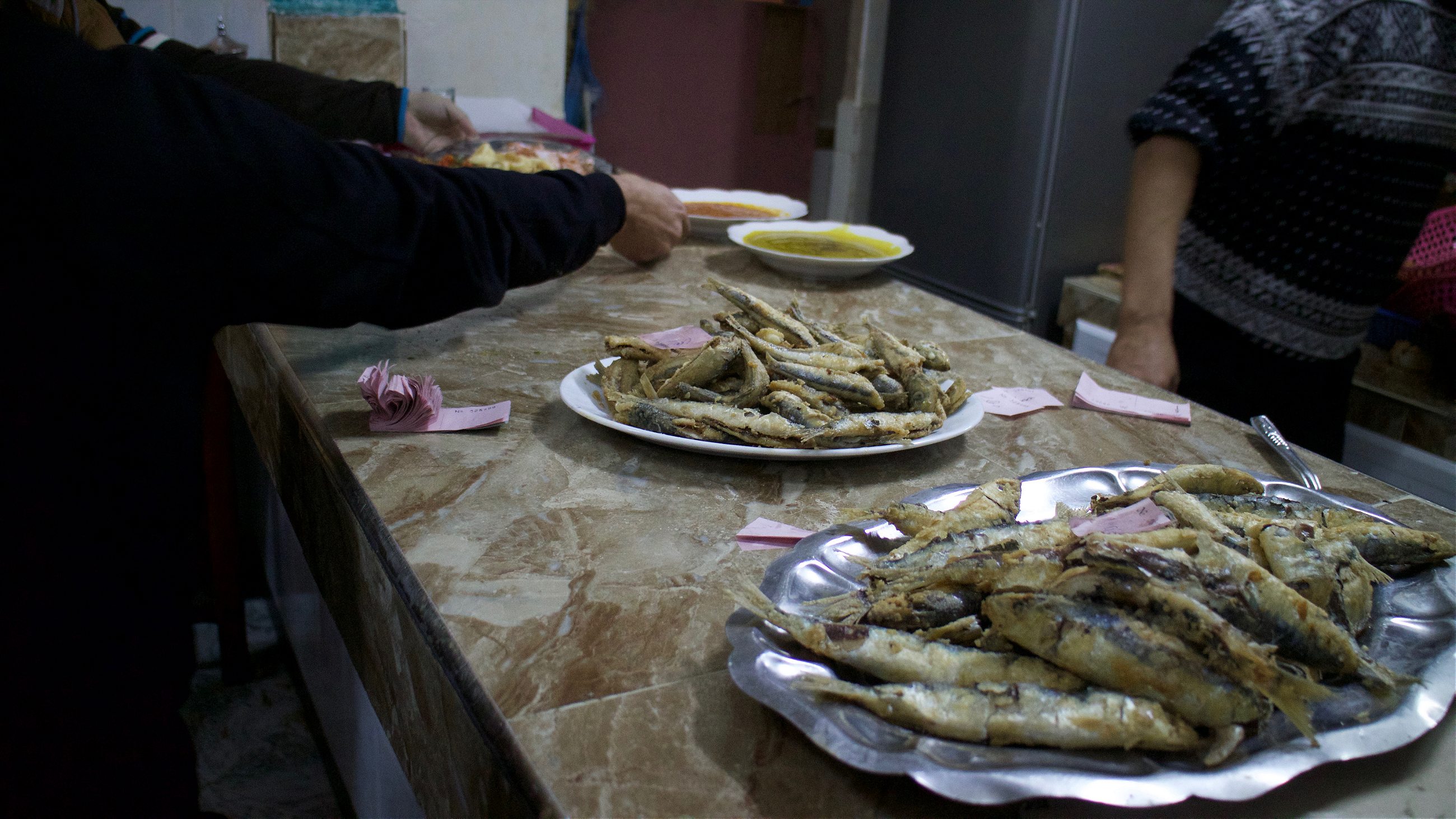Months after a bloody death, a Moroccan seaside town looks to the future.
In an empty lot beside the port of Al Hoceima, vendors sell fish they’ve bought from boats back from a day at sea. The sun has set; it’s dark and a storm has just subsided. The only light radiates from the dingy, fluorescent bulbs hanging off the steel frames of each fish stand. These bulbs illuminate the fishermen’s catches, a few puddles of rainwater and not much else.
Al Hoceima sits on Morocco’s Mediterranean coastline. Unlike Moroccan cities like Marrakesh, Al Hoceima isn’t a tourist destination for glamorous jetsetters. But, to Moroccans, the stunning vistas of the surrounding mountains and the sea are thought to be some of the country’s most picturesque. During the summer months, crowds flock here to lounge on the sandy beaches, eat fresh seafood, and enjoy the striking views of the Rif, the imposing mountain range that towers over the sea.
Now, it’s Al Hoceima’s off-season and the town appears as a shell of its summer self. There aren’t many people down at the port: just the fishermen, a few locals who live in the city above the port, and vendors selling the day’s catch. Circling the port are a few seafood restaurants and maritime administrative buildings made of blue and white stucco. It’s a chilly 40 degrees Fahrenheit and everything—my clothes, my hands, my feet, and my notebook—is damp.
Al Hoceima is inaccessible by train, so most people drive or use Morocco’s extensive bus system to get there. Even though it’s only around 250 miles from Rabat, the capital, the bus can take nine or ten hours. At first, the roads are level; it’s a smooth ride until the bus turns north into the Rif Mountains. There, the roads deteriorate. Further into the mountains, the bus begins to shake due to rocks and uneven paving. It’s jagged, steep, and intimidating.

Besides my female colleague, there are only men in the port. The port feels like a barbershop or locker room with especially good views; the crackling male voices, laughter and testosterone emanate a very particular kind of warmth and camaraderie. Fishermen unload the day’s catch. Men in work gloves standing over wooden tables chop up fish and clean them for customers. Teenagers smoke cigarettes and pace around aimlessly.
Only a few months ago, this quiet port town became an international news flashpoint after the death of a fish vendor sparked Morocco’s largest protests since the Arab Spring.
Mohcine Fikri bought all the swordfish he could from fishermen docked at Al Hoceima. The 31-year-old planned on taking the haul to Tangier, where business and tourism continue to boom through the off-season. But, before he could, it was confiscated. Citing a rarely enforced environmental law that prohibits fishing certain species in the Mediterranean, police seized the contents of his truck and dumped the catch in a nearby garbage truck.
Because the catch was worth around $5,000 (other estimates put the value as high as $11,000) a desperate Fikri jumped into the back of the garbage truck to retrieve it. It was the last thing he would ever do.

In Al Hoceima, customers buy fish right off the boats in the market, and then take whatever looks best into one of the several restaurants surrounding the port. They deposit their fish at the kitchen to be prepared and sit for a few minutes while it is fried up and seasoned with lemon, parsley, garlic, and olive oil.
I begin to survey the selection. Ultimately, a vendor helps me settle on some squid, shrimp, and dorado royale, a white fish.
It’s our first night in the port and we choose a small restaurant whose inside is painted a warm, beige hue. It has no more than a dozen tables and a Moroccan flag is painted on the ceiling. Delighted to be inside and out of the cold, we hand over our selection, grab sodas, and wait at our for our fish to be served on a platter with a side of fries.
Our fish arrives steaming, wrapped in a thin piece of newspaper with grease runoff oozing into the paper. The whitefish is fried and buttery, but unlike most fried fish, it doesn’t taste heavy. It’s crunchy, savory and tastes as though the fish’s saltwater habitat has been cooked into the fish. My fingers cannot undress each shrimp quickly enough from its shell and this only gets worse as butter coats my fingers.

The restaurant is getting louder and warmer as fishermen and salesmen alike begin to fill the tables. The squid, overflowing off of the metal platter, is tender, some of it’s flesh still purple.
When we exit the restaurant, the cold, salty air is stinging my lungs so I light up a cigarette and think about how I’m going to puncture the port’s overwhelming calm and cheerfulness by asking people about how they’ve been feeling in the wake of the recent tragedy.
When Fikri jumped into the back of the garbage truck, three friends followed. I find one of the men who jumped in behind Fikri, Mouhcine Dikri, at the port. He is eager to give me his firsthand account of the events of the day.
“I wasn’t scared because I didn’t believe I would die,” Dikri tells me. Everyone was certain that the garbage truck would be turned off with the people inside. What happened next was unexpected. The garbage truck’s compactor was turned on, and the grinders began to descend on the four men inside. Three escaped, but Fikri, the first to enter, was trapped inside. There was a lot of noise and people yelling “stop!” Dikri remembers. He says, with the noise, Fikri must’ve thought, “Okay, now someone has to stop the machine.” But nobody did.
Instead, Fikri was trapped inside and left to be ground into pieces.
“I couldn’t move. I was shocked,” Dikri remembers, lighting a cigarette.
People started banging on the truck. A crowd began to form, people yelling in horror and screaming at both the police and civil guard.
Sometime in the middle of the night, Dikri says, crime scene investigators arrived from Rabat and found that the police report filed after the incident was falsified; it said that the fish was confiscated to pay off a debt, not because of the rarely enforced environmental law. Dikri says that in Al Hoceima, people have always caught swordfish and there has never been a problem or even a sign that says it’s prohibited.
In the aftermath, rumors circulated that the police, intending to “teach a lesson,” ordered the compactor turned on while the men were inside. The incident was caught on video. Aided by Twitter hashtags in Arabic that read “Grind him” and “We are Mohcine Fikri,” it immediately went viral after being posted online and became the stimulus for the massive nationwide protests to come.
But Dikri’s misfortunes were far from over. He had sold some of the confiscated fish to Fikri, who intended to pay him once the fish were sold. “When Mohcine died, the fish were gone and I was dead, too,” he says, laughing darkly. Gone with the fish were his savings; he is now in debt and facing limited opportunities. “Here, we only have the port for work. We don’t have factories or anything else.”
Fikri’s death became a symbol for broader political grievances
Protests lit up Al Hoceima almost immediately in the following days. They quickly spread across the country to cities like Rabat, Casablanca, Nador, Tangier, and Marrakesh. In each city, tens of thousands of protestors took to the streets for planned demonstrations week after week to bring attention to hogra, a term that refers to shame and anger, specifically in the context of government subjugation. Many saw themselves and their own disillusionment with the Kingdom’s politics wrapped up in the story of Mohcine Fikri being ground to death.
As protests spread throughout Morocco, the vigor of protests in Al Hoceima started to garner global attention. Newspapers compared Mohcine Fikri to Mohamed Bouazizi, the Tunisian fruit vendor whose self-immolation lit the match that started the Arab Spring. Despite the fact that Fikri does not seem to have forfeited his life willingly, there are some clear similarities: both were North African; both sold food; many observers saw them both as having been arbitrarily targeted by police; and their deaths became symbols for broader political grievances throughout their respective countries.
But, this comparison glosses over what makes Al Hoceima, Al Hoceima. Morocco is not Tunisia. Even before Fikri’s death, the Rif region has long held a reputation for being an epicenter of resistance and anti-government protest; a lot of these protests revolved around demands for regional autonomy and cultural recognition, a context Tunisia does not share. The people here identify ethnically as Amazigh, also known as Berber. Unlike Morocco’s Arab majority, the Amazigh speak a different language, have different cultural customs, and remember the nation’s past differently. In the 1920s, led by Abdelkrim El Khattibi, Riffians, as the people of the region are known, declared themselves independent from both Spanish colonists and Moroccan Sultans. In the 1950s, this region also protested against the newly independent kingdom and later, in the 1980s, against the harsh rule of King Hassan II.
After Morocco gained independence, many Amazigh felt that the restored monarchy exercised the same kind of illegitimate control as the European colonizers. As Morocco began creating a new national identity, Amazigh history was erased, children were forced to speak Arabic in schools, and the region remained isolated and underdeveloped. This legacy was invoked during the Fikri protests, first in Al Hoceima, where protests were most energized, and later throughout Morocco as demonstrators flew Amazigh flags.
Moroccan authorities arrested eleven of those involved in Fikri’s murder for involuntary manslaughter and forgery in November and have arrested a twelfth man this month, a strong response that many observers felt was meant to dispel political anger. Protests have now recededed throughout the country, but in Al Hoceima, the underlying issues that Fikri’s murder brought to the forefront remain unchanged; the city and surrounding area are still victims of underdevelopment and governmental neglect. In a time when Morocco invests heavily in industry and construction in other parts of the country and plans to build a high-speed train along the Atlantic coast, Al Hoceima continues to have some of the worst roads in the country, as well as comparatively higher unemployment.
Since arriving, I’ve been taken by Al Hoceima’s overwhelming calm and peculiar stillness; it feels more like a sleepy beach town than a cauldron of separatist politics. Despite the fact that just a few months ago, tens of thousands demonstrated in the streets, it seems as though today, people work, eat, and go about the same routines as before the storm of protests began.

The next night I return to the port to eat sardines. The sea is an ethereal, reflective green and seagulls are everywhere. I arrive in time to see the ships dock and unload. I walk through the docks, stepping over nets and tackle, and eventually start talking to a man in good spirits who is selling cigarettes, gum, and other snacks to the fishermen as they return to land.
He helps me find a boat with sardines, which I’m given for free for “le bonheur du port.” With my sardines in tow, I accompany many of the fishermen from L’Espadon, one of the returned boats, straight to Ismaeliyya, another restaurant that sits on the port. L’espadon means swordfish, the same fish that was confiscated from Mohcine Fikri. When I ask about swordfish, the upbeat tenor of the group’s conversation changes from lighthearted to somber. Fishermen tell me people have been catching it and eating it for years. But not anymore.
Going out to sea daily to fish is a difficult and often isolating job but Ismaeliyya feels like a high-school cafeteria in both its décor and a sense of camaraderie. People stand up and have conversations with men two tables apart. There are blinding fluorescent lights, cream-colored walls, loud acoustics. Crunched in at small tables, fishermen and vendors convene, laugh and rehash stories about their families and the day at sea. The food may be decadent, but the restaurant is no frills.

The sardines, fresh from the boat, are salty and have a strong fish aftertaste, like the best ones always do. I hold each fish down with one hand and use my fork to strip the meat from the spine. My table is using several languages—a combination of French, Arabic, English, and Spanish, with greetings in Amazigh. A man sitting next to me, with smiling and with a friendly demeanor, tells me a story about a man who spoke six languages and came to Al Hoceima. The man went and talked to a fishmonger who commented on the man’s impressive language faculty. The man said, “Without speaking languages, you can’t know culture and your life is worthless.” The fish seller nodded. The man and the fishmonger were walking along the beach, and the fishmonger pushed the man into the sea. The man couldn’t swim and struggled in the water. The fishmonger said, “Without knowing how to swim, your life is worthless.”
Not everyone, however, is ready to leave Fikri’s story in the past. I leave the port to go to an activist gathering at another fish restaurant, up the hill in the city center. There, I meet Mohcine Fikri’s cousin, Alaaeddine Chams. He starts to tell me the story of Mohcine Fikri, but in doing so is almost clinical and devoid of emotion. I assume he’s either numbed by the tragedy or has gotten used to describing his cousin in life and in death. I get frustrated, so I interrupt and ask if it’s difficult to have journalists parachute in and repeatedly ask these questions.
There’s a break in his stoic façade and he’s on the verge of tears. “Yes, it’s not easy. But that’s life. That’s all it is. Today, it’s Mohcine Fikri; he’s dead. We can’t change this reality. All we can do is keep living and try to avoid having other Moucine Fikris.”
Then, we go eat more fish.